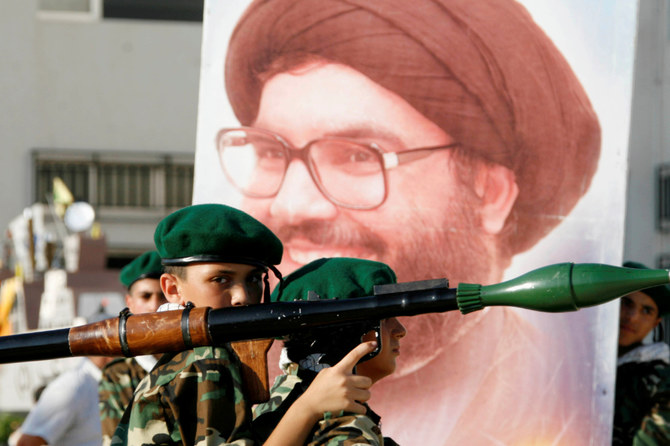NEW YORK: The shocking extent of Hezbollah’s covert and illicit activities around the world is revealed in an interactive map created by the Washington Institute for Near East Policy.
It includes about 1,000 incidents and activities spanning more than four decades, including a thwarted plot in Cyprus, a bus bombing in Bulgaria and the group’s role in the Syrian Civil War.
LOOK: Interactive map of Hezbollah's criminal activity
“Hezbollah invests a lot of time and effort in its media campaigns to publicize (what) it wants you to know about: politics, social, charitable and educational activities, (and) its NGOs,” said Matthew Levitt, the Fromer-Wexler Fellow and director of the Reinhard Program on Counterterrorism and Intelligence at the institute.
“But Hezbollah invests at least as much time, effort and money trying (to) obfuscate its covert activities — criminal enterprise, money laundering, military (and) terrorist activity — in Lebanon, in the region and around the world.”
For decades, academics, officials and policymakers have had difficulty accessing comprehensive information about the party’s global activities. Its golden rule, according to details that emerged during the trial and conviction in New York last year of Hezbollah operative Ali Kourani, is “the less you know, the better.”
“This project aims to poke a big hole in that rule,” said Levitt. “(It) will hopefully enable people to have a more robust conversation about the sum total of Hezbollah’s activities.”
The map is the result of several years of work by Levitt. He has been studying Hezbollah since the 1990s, focusing on its terrorist activities, weapons procurement, money laundering, drug trafficking, and other illicit financial schemes. While compiling the information for the map, he interviewed people around the world, and obtained court documents and government reports.
The result is the world’s largest repository of open-source documents on Hezbollah. Searchable by category, location, timeline and keywords, the multi-media tool lays bare the scope of Hezbollah’s activities, from the aliases its operatives use and the routes they take when traveling to more complex themes relating to the nature of the organization and its relationship with state sponsors.
“Hezbollah is intimately connected to Iran,” said Levitt. “It always has been at an ideological level, and at an operational level ever since Hezbollah sent some 1,500 Quds Force officers to the Bekaa valley to help bring a motley crew of disparate Shiite militant groups together into one party of God: Hezbollah. There’s a lot of declassified CIA material from that period.
“It’s also true (that) while Hezbollah and Iran are very close, Iran gives Hezbollah some significant freedom of decision-making within Lebanon itself. The way I describe this is (that) even within a good marriage there are ups and downs. There’s a strong marriage between Iran and Hezbollah. Ever since the Syrian war — with Hezbollah and Iran fighting together in the trenches, and together overseeing the rest of the Shiite militias — they have become much, much closer.”
In addition to collecting and organizing information that was already known, the map project reveals other details that were not common knowledge.
“There are entries with brand new information, such as the name of the Lebanese-French academic who bought Hezbollah a safe house (in which) to stock explosives in Cyprus,” said Levitt.
“There is a lot of declassified intelligence material about previously unreported incidents. In the late 1990s, for example, Hezbollah, together with the Palestinian Islamic Jihad, was plotting to target Jewish immigrants from the former Soviet Union and the synagogue in Warsaw, according to the CIA.
“And then (there are) simply more mundane things, just making more public things that have already been disclosed. For example, (Hezbollah parliamentarian) Mohammed Raad was planning, together with Hezbollah’s senior security official Wafiq Safa, to identify Hezbollah operatives who could obtain foreign citizenship and then be deployed abroad on Hezbollah operations.”
According to Levitt, the map debunks the myth that Hezbollah’s military wing is a disparate entity within the wider organization.
“What this map is trying to do is present information that has not been in the open-source domain at all or not easily accessible, and certainly not all available in a one-stop (location) to people so that they can have this conversation,” he said.
“I think that’s going to put pressure on Hezbollah because of the fact that, while it has not been super well-reported, Hezbollah does engage in a very, very wide range of illicit and violent activities that often have nothing to do with its position in Lebanon or its hatred of Israel.”
Visit www.washingtoninstitute.org/hezbollahinteractivemap to view the map. It is an ongoing project that will continue to be updated with new information and documents.






























